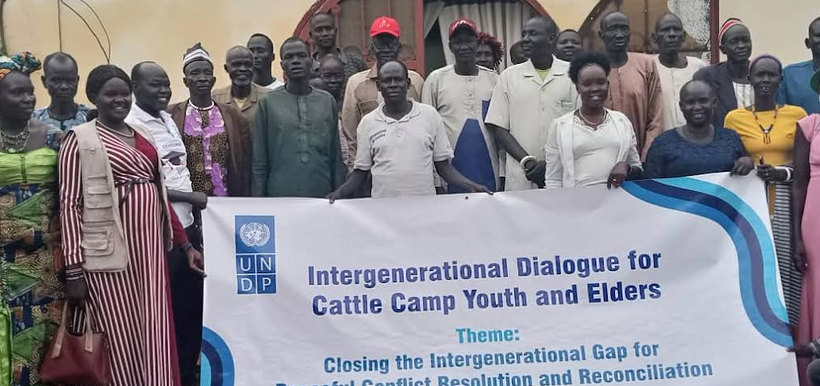Traditional chiefs in Lakes State have complained about meddling by County Courts and the state High Court in the trial of cases involving traditional marriages which they fault for the high rate of divorce in the state.
The chiefs voiced their complaint on Saturday at the end of a three-day intergenerational dialogue organized by UNDP which brought together 50 participants including chiefs, elders, youth, and women.
Sultan Taban Malual Polic, the paramount chief of Mathiangkok payam in Rumbek East County told Radio Tamazuj over the weekend that the discussions also focused on discipline and respect between children, elders, and wives and husbands.
“When there is a misunderstanding between a woman and a man, the woman will immediately run to open a case before the County Court Judge or High Court Judge. Cases of spouses are not the responsibility of common law courts but our responsibility as chiefs in the community and not law judges,” he explained. “When a woman was married traditionally and her bride price was paid in cattle, the local chief knows about it and not the judge in the court. The High Court Judge is only responsible for the cases of murder and not marriage.”
“The responsibility of a woman married with cows is not for High Court judges and this issue of women opening cases in common law courts instead of traditional courts has spoiled so many marriages in Lakes State,” Sultan Malual added.
He also advised youngsters who live in cattle camps not to insult and disrespect elderly people.
“Do not insult elderly people in the community and defy their advice. The outcome of insulting elderly people is a curse because they can invoke the gods,” the chief counseled. “You have to listen to them and avoid insulting elders and do not defy their words.”
A female participant, Teresa Akon Tong, said she attended the dialogue to understand the issues causing conflicts between elders and the youths and friction in marriages.
“The youth no longer respect and listen to elders in our community. Even when a mother tries to advise her daughter not to dress decently, they do not listen. This has caused problems within families and the community and this is what we have discussed,” she said. “The dialogue resolved that people should go back home and educate their children that our culture demands that elders are respected and that the elders in turn respect and advise the youth.”
“When a girl is brought up well and is respectful, she will attract a lot of cattle in bride price and that is what we discussed and resolved to embrace our positive cultures and the meeting ended very well,” Akon said.
For his part, Zechariah Kuoi Majak, the director general in the Lakes State peacebuilding ministry, reiterated that the meeting discussed the differences between the youth and elders.
“When you respect your children as a father, then your children will grow up well and your children will respect you too. This is not the case now because when the young people in the cattle camps want to migrate, they just decide by themselves and move from one cattle camp to another without informing the elders, chiefs, and their big brothers,” he explained. “We resolved this issue and we have formed a committee and when there is a plan for cattle migration, the young people should first inform the elders.
Meanwhile, Angelina Adhel Malual, one of the dialogue facilitators, said the meeting aimed at closing the gap between elders and the youth.
“We have different generations with different age groups and different ways of life and that is why we bring in cattle keepers and the elders together. It is very important for them to share and understand themselves,” she said. “If we do not listen to the elders, we will not learn from them as a young person because elders know how to connect the past and the present by telling stories and giving advice on how the youth should behave well.”




